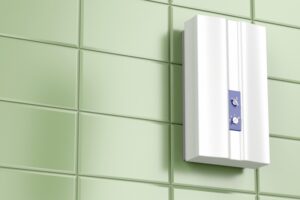Do you have a tank water heater in place? If so, then its main feature is a storage tank that holds gallons of water that gets heated up by a heat exchanger within the system. It has a component called an anode rod that absorbs rust and corrosion so that the rest of the system does not, and this anode rod must be checked on during each annual maintenance session.
But tank water heaters aren’t the only type of water heater that needs maintenance! Even if you have a tankless system in place, that needs a tune-up too. True, it doesn’t have standing water in it, but it can suffer from some of the same problems that a tank system can–like scaling. Wondering what scaling is? Read on to find out!
How Scaling Happens
You’ve maybe noticed at some point a flaky white, green, or yellow buildup forming around a drain, even if it wasn’t in your own home. This is the result of scaling. Scaling is the mineral deposits that get left behind thanks to hard water–water with a high level of calcium and magnesium, and sometimes iron, too.
These mineral deposits are harmless to you, but can create chaos in your plumbing system.
How Scaling Causes Damage
Scaling negatively impacts your water heater in a number of ways. First off, buildup can develop within the pipes and effectively block water flow from moving through if it develops a thick enough layer of mineral deposits.
What homeowners most commonly notice, however, is the damage that occurs to the tank of the water heater, in the case of a traditional water heater. Minerals build at the bottom of the tank and prevent the water from moving through.
The reason we say that homeowners typically notice this is because as scaling settles on the bottom of the tank, it starts to rattle around, and actually can become quite noisy!
The Signs of Scaling
Probably the most apparent sign that scaling is negatively impacting your water heater is, as we mentioned above, the noise it makes when it rattles in the tank. This is often described as a popping or knocking sound. This happens as steam bubbles attempt to escape past the layer of sediment at the bottom of the tank.
Scaling can also negatively impact the temperature of the water, especially in a tankless water heater. Mineral deposits build up and coat the heat exchanger, which makes it more difficult for water to pick up the heat. You may also notice low hot water pressure if scaling starts to clog up the pipes that lead out of your water heater.
What Can Be Done?
Schedule routine water heater maintenance! Whether it’s flushing your tank or cleaning out your tankless system, we’ll take care of the problem during your annual maintenance appointment.
Additionally, you can help prevent the problem of scaling by having a whole-house water softener installed to tackle hard water.
To learn more about water heaters in Lubbock, TX and to schedule service for your water heater, contact JD’s Prompt Plumbing, Heating & Air Conditioning today!


